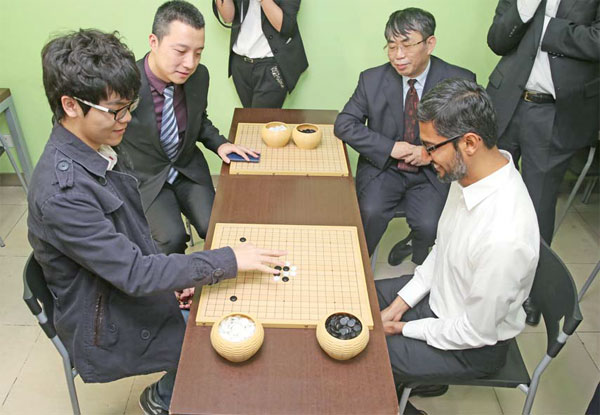IN BRIEF (Page 2)

| Google CEO Sundar Pichai plays Go with Ke Jie, the world's top player, during a visit to Nie Weiping Go school, one of the most professional Go trainning bases in China, on March 31. The artificial intelligence program AlphaGo, which recently defeated South Korean grandmaster Lee See-dol, was developed by Google. Ke has said he is keen to challenge AlphaGo. Provided to China Daily |
Crackdown snares human traffickers
An operation in February targeted at human trafficking led to the discovery of 2,943 illegal immigrants, mostly from Southeast Asia, who had been smuggled into Hong Kong, authorities said on March 30. Police detained 142 traffickers from China and other countries.
Bribery database cleans up bidding
A database of companies and individuals found guilty of bribery is helping authorities clean up bidding for major projects, the Supreme People's Procuratorate said on March 30. The system has been running since 2011. Figures from the SPP show inquiries were conducted last year into more than 4 million organizations and 5 million individuals.
Cuts to social security payments ease burden
Twelve provinces and municipalities have cut social security payment requirements for employers and employees in response to the central government's call to reduce the burden on businesses. However, analysts said the pension fund, the largest of all government programs, is unlikely to see cuts in payouts. Data compiled by China Daily show the reductions mostly concentrate on smaller programs dealing with things such as workplace injuries, unemployment and childbirth insurance.
HK to limit vaccines for nonlocal children
Public health clinics in Hong Kong are to place a monthly cap on immunization services for nonlocal children after a surge in requests from the mainland. The city's health department said on March 30 the limit of 120 will start on April 1. It said booking hotlines had been inundated after reports in February of expired vaccines being sold on the mainland.
E-car rollout aims to reduce air pollution

Beijing will put 6,000 more electric cars into government use this year as part of efforts to curb air pollution. Last year, city authorities leased 1,300 e-cars, said Xu Heyi, chairman of BAIC Motor Corp. The expanded fleet will provide services for 91 ministries and central government departments and 180 municipal departments.
City asks public to choose eco-burials
Beijing will promote smaller tombs and eco-friendly burials over the next five years to better protect the environment, city officials said. In Chinese tradition, the deceased are buried in ground tombs that can occupy several square meters, but people are being encouraged to use new methods such as tree, flower and sea burials.
Nations unite to fight border crime
China will partner with the Association of Southeast Asian Nations to set up a law enforcement college in Yunnan province to tackle cross-border crime, the Ministry of Public Security said on March 29. The college will be funded by the ministry. Cross-border crime, including terrorist activities, the manufacture and trafficking of drugs, human trafficking, firearms smuggling, illegal immigration, cybercrime and telecom fraud, have become more prevalent and complex in recent years and pose a serious threat to regional security and stability, experts said.
Renting while owning is preference of some
About one-third of the population of Beijing - 7 million people - rented their homes last year, according to a report by Dingding Rent, an online rental service run by housing agent Lianjia. Half the renters were under 30, 17 percent over 41. Some renters own property in Beijing but choose to live in rented accommodation to be close to their work or children's school, it said.
Poll: 80% support ban on bear bile extraction
More than 80 percent of people agree that extracting bear bile should be banned in China, according to a survey. The AITA Foundation for Animal Protection and pollsters Horizonkey interviewed 1,892 people in 10 cities in February and March and found 97.4 percent felt extracting bile - a digestive fluid stored in the gallbladder - from captive bears was "very cruel". Results of the survey were released on March 29 during the First Asiatic Black Bear Forum.
Poverty relief fund abusers targeted
China will launch a five-year crackdown on corrupt officials engaged in poverty relief work. In the past three years, prosecutors have probed 2,295 officials who manage poverty alleviation - 579 in 2013, 783 in 2014, and 933 in 2015, according to the Supreme People's Procuratorate on March 29. The sharp rise in corruption in the sector is due to a spike in the number of projects and funds, as well as lax supervision, an unidentified official with the SPP's anti-corruption bureau said.
Canned island air becomes best-seller
About 300 cans of fresh air from Hainan province, a seaside tourist resort, were sold at the 2016 Hainan International Tourism Trade Expo. Selling at a discount price of 29 yuan ($4.50; 4 euros), the cans sparked a buying spree by enterprises and tourists from cities regularly affected by smog. The air comes from Bawangling, where the forest coverage is 98 percent.
Scholarships to be offered to Egyptians
Outstanding Egyptian youths wanting to study in China will soon be able to take advantage of 500 freshman scholarships provided by the Chinese government, Vice-Premier Liu Yandong said on March 26. She made the announcement while addressing a forum of Chinese and Egyptian university chiefs in Cairo. Right now, more than 800 Egyptians study in China, and more than 2,300 Chinese study in Egypt.
Team to probe illegal vaccine sales
China has vowed to thoroughly investigate the recent scandal involving vaccines worth 570 million yuan ($87 million; 78 million euros). The State Council has set up a team to look into the regulatory system that failed to stop the nationwide distribution of substandard vaccines since 2011. The team includes officials from the China Food and Drug Administration, National Health and Family Planning Commission, Ministry of Public Security, Ministry of Supervision and the Supreme People's Procuratorate.
More insights offered into PLA operations
China's armed forces have been told to open more barracks to the public this year, the PLA Daily reported on March 28. The move is part of efforts to promote national defense education among residents, strengthening patriotism and empathy with the army. Various open days are already planned for this year to offer visitors a glimpse of life at military camps nationwide. China will also launch a defense education campaign this year as it marks the 95th anniversary of the Communist Party of China and the 80th anniversary of the end of the Long March, a forced expedition that eventually laid an important foundation for the Communist victory.
Urumqi buildings to get energy upgrade
An energy-saving reconstruction project involving 160 buildings in Urumqi, the Xinjiang Uygur autonomous region, will be carried out in June, authorities said on March 28. The project will retrofit public buildings such as schools and hospitals with heating, ventilation and electrical systems. The National Development and Reform Commission approved an investment of 696 million yuan ($107 million; 95 million euros) last week.
Drinking water a winner in Tibet
Drinking water has been making a splash in the Tibet autonomous region, providing jobs and boosting the economy. According to the regional government, Tibet's production of natural drinking water reached 425,600 metric tons last year, up 178 percent year-on-year. The importance of the industry was among the topics for a working conference on Tibet in August.
Military barred from commercial activities
China's top military authority has ordered the People's Liberation Army and the armed police force to gradually stop all commercial activities. The Central Military Commission said it plans to eradicate all profit-making activities such as renting property in three years. It requested units to stop signing new contracts and to try to negotiate with civilian clients to cancel existing ones.
Police catch 1,750 drug users since Jan 1
Beijing police have caught 1,750 people using illegal drugs so far this year, the Beijing Municipal Public Security Bureau said on March 27. The bureau said it had dealt with more than 300 drug cases involving 19.8 kilograms of narcotics and 345 suspects since Jan 1. Over the same period, 540 people were caught driving under the influence of drugs, it said.
Customs teams finds khat in mail parcel
Customs officers in southern and northeastern China have reported seizures of narcotic plants in the mail from Ethiopia and the United States. On March 4, Dalian customs found seven boxes containing more than 60 kg of khat leaves, which contain an amphetamine-like stimulant. It is illegal to plant, possess, sell or consume khat in China.
| Swiss high wire artist Freddy Nock, 51, walks on a steel wire on March 30 above a giant sinkhole in Wulong National Geology Park in Chongqing, as part of the "Running Wireman" challenge. Nock won the competition, finishing the 100-meter walk on the 300-meter-high steel wire in 42.04 seconds. The two other competitors were from China's Xinjiang Uygur autonomous region and Italy. Provided to China Daily |
(China Daily European Weekly 04/01/2016 page2)
Today's Top News
- Takaichi must stop rubbing salt in wounds, retract Taiwan remarks
- Millions vie for civil service jobs
- Chinese landmark trade corridor handles over 5m TEUs
- China holds first national civil service exam since raising eligibility age cap
- Xi's article on CPC self-reform to be published
- Xi stresses improving long-term mechanisms for cyberspace governance
































